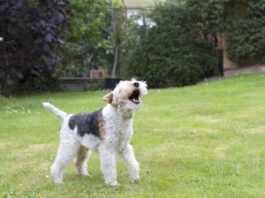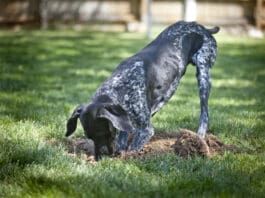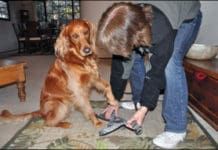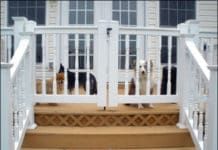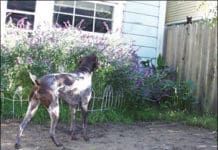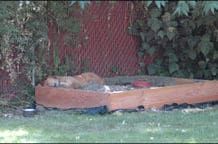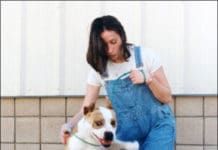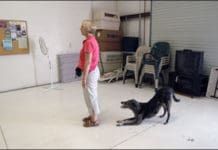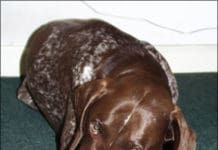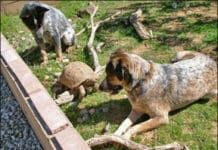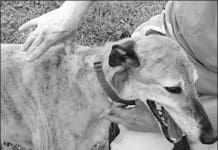Walking An Excited Dog
You contemplate taking your dog for a walk with mixed emotions. You love the idea of going for a companionable stroll through the neighborhood together, but it's a major hassle to get out the door. When you pick up his leash he becomes the Tasmanian Devil body slamming you, racing around the foyer, and bouncing off the plate glass door with such intensity you're afraid he'll crash right through it.
Door Darting Management
or securely enclose your porch or deck."
Train Your Dog to Stop Chasing Cats
Dogs are a predatory species. While cats think of themselves as predators, dogs often think of cats as prey. Still, many canines and felines live together in happy harmony. If yours don’t, here are some things to do when Fido chases Felix. Separate dog and cat when you’re not there to supervise. You need to protect your cat from injury or possible death, and you want to prevent your dog from practicing the unwanted chasing behavior. Depending on the intensity of the chasing behavior, you may want your cat behind a solid door when you’re away to ensure protection, or baby gates may be enough to give kitty safe zones to use as she chooses. When you are there to supervise, you still need to manage your dog so he doesn’t get reinforced for chasing the cat. Having something run away when you chase it is highly reinforcing to a dog with strong predatory behaviors.
Installing Safe and Affordable Fencing for Dogs
There was a time when no one thought twice about letting their dogs roam the neighborhood. A fenced yard was almost unheard of. If you grew up in the 1950s and '60s as I did, you may remember those times. Dogs were well socialized, loved kids, and it was no big deal when the neighbor's dog came over and visited your female dog in season. Of course, they also chased cars, got pregnant a lot, and occasionally although rarely bit someone. You may also remember, as I do, a long list of childhood pets who got shot, hit by cars, or simply vanished, having fallen victim to who knows what fate. Today, our canine companions are more likely to be spayed or neutered, vaccinated, and responsibly contained. As a result, they tend to live safer, longer lives. But having a fence isn't always the be-all, end-all solution that it seems to be. Fences can bring on a host of challenges that our parents never faced with the family dog a generation ago.
Help for OCD Dogs
that he fails to drink! Then
Solutions for a Dog Who Digs the Yard
The perfect storm, canine edition: Combine one dog who is accustomed to and prefers spending time outdoors; a spate of hot, dry weather; a lush, productive garden full of herbs and tomato plants growing in raised boxes full of expensive, loamy soil and moistened three times daily by an automatic drip system. What do you get? Holes dug in the garden and an irate husband! Our new dog, Otto, nearly made himself quite unwelcome on his second day in our home. Every time I turned around, I'd find him digging in any place we'd recently watered, including the lawn, a flowerbed in front of the house, underneath a gorgeous hydrangea bush that's already hard-pressed to survive our hot summers, and, most seriously, the vegetable beds in back. Can't you train this dog not to dig?" my husband implored. But this wasn't a training issue; I've been trained enough by Pat Miller and our other contributing trainer/writers to recognize a management situation when I see it!"
Canine Acupressure to Calm High Energy Dogs
These are too-common refrains of guardians of dogs who are bouncing off the walls: "She has way too much energy!" "This dog is out of control!" "I've had enough of this crazy dog, he's a maniac!" You can love your dog to pieces, but if his behavior is unruly, it can be very hard to live with on a steady basis. One of the most common reasons dogs are released to shelters is because they are out of control. Hyperactive dogs are frequently difficult for their owners to enjoy. Surviving this situation may stressful for you, your family, guests - and the dogs themselves. The first step is to have the dog evaluated by your trusted holistic veterinarian, to determine if there is any underlying medical condition. Hyperactivity, also called "hyperkinesis," actually can be the result of a medical condition that is characterized by frantic behavior, incessant movement resulting in exhaustion, a consistent elevated heart rate, panting, loss of weight, vomiting, and increased appetite or loss of appetite. Canine compulsive disorders such as tail-chasing, self-mutilation, and other nonproductive, repetitive behaviors are usually considered forms of hyperactivity.
Uncommonly Calm Canines
Most dog owners are pleased when their dogs are calm - even the owners of high-energy competition and working dogs, when those dogs are "off-duty." Some owners may go to great - sometimes misguided - lengths to achieve the coveted calm condition. Humans who understand the appropriate way to help a dog learn to be calm can make the difference between the canine companion who finds a lifelong loving home, and the one who ends up - sometimes several times in his life - gazing sadly out from the chain-link kennels of an animal shelter. Calm is a highly valued, hard-won, and sometimes transitory state in our own household. With four dogs in the Miller pack, two of them proud representatives of the herding group, calm is something we have to work at. We use the time-honored recipe of exercise, management, and training (and of course, lots of love) to help our canine family members be a peaceable pack.
Canine Stimulus Control Through Positive Dog Training
Canine Charlie willingly sits on cue, but when clicks and treats don't come fast enough, he starts trying other dog behaviors in his repertoire - with rapid-fire offerings of shake, speak, down, and even a roll-over finding its way into the mix. He gets so excited about the dog training game that sometimes he doesn't even bother to sit first when asked, but drops right into the down - his favorite position. Charlie, an eager worker who loves positive reinforcement, has learned a lot of different behaviors and is anticipating his human's cues for all his favorite tricks. He clearly doesn't have his behaviors under stimulus control.
Dogs and Puppies Chew For a Number of Reasons, Learn to Properly Channel This...
between three and six months of age. While the baby teeth are shedding and the adult teeth are erupting
Dogs and Cats Living Together
You've no doubt heard the phrase fighting like cats and dogs." The media likes to play up stories about personality differences between "cat lovers" and "dog lovers
Treating Canine Compulsive Disorders With Acupressure Techniques
Does a worried dog sing a worried song? A dog's worried song" is often expressed in quirky



